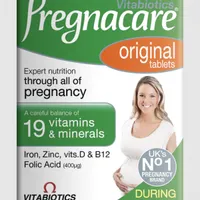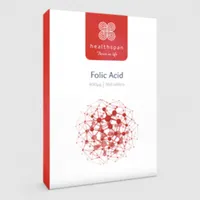Folic acid in pregnancy: how much do you need and when to take it
If you plan to get pregnant, or have recently found out that you are having a baby, folic acid is a very important vitamin.


Parenting advice, hot topics, best buys and family finance tips delivered straight to your inbox.
You are now subscribed
Your newsletter sign-up was successful
If you plan to get pregnant, or have recently found out that you are having a baby, folic acid is a very important vitamin.
Also known as folate or vitamin B9 (folic acid is the synthetic version), this vitamin is beneficial both when you're trying to conceive and in your first trimester. Not only can it treat folate deficiency anaemia, but it helps a foetus grow normally and lowers the risk of neural tube defects such as spina bifida – a condition where a baby's spine and spinal cord don't develop properly during pregnancy.
Even if you're not pregnant, or planning on becoming so, folic acid keeps the nervous system in good working order. Alongside vitamin B12 it also helps form healthy red blood cells, which are integral for carrying oxygen around the body. We spoke to obstetrics and gynaecology consultant Jess McMicking and registered nutritionist Rob Hobson about how much folic acid you need and how folic acid helps gives your baby a great start.
What is folic acid?
Folic acid, folate and vitamin B9 are essentially the same thing. However, there is a difference. "Folic acid is the man-made form of the B vitamin folate," says Jess.
Like other B vitamins (as well as vitamin C) it's water-soluble. Unlike fat-soluble vitamins, which the body stores, water-soluble vitamins dissolve quickly and the kidneys excrete any excess. "B vitamins are not stored in the body," says Rob. "So they must be gleaned from the diet on a daily basis. Folates are found naturally in food, while folic acid is a synthetic form found in supplements," he explains.
Why do you need folic acid during pregnancy?
All vitamins and minerals play a part in the healthy functioning of our bodies. But, folic acid is particularly important during pregnancy because of the essential role it plays in early foetal development.
Jess McMicking, a consultant for the online women's health clinic Naytal, explains: "Folic acid is vital in pregnancy as it helps the development of the neural tube, which forms your baby’s brain and spinal cord." In fact, she says, supplementation prevents up to 70% of neural tube defects. A deficiency is linked to a higher incidence of neural tube defects where the spine, skull or brain may not form properly, such as spina bifida.
"Your baby forms the neural tube in the first 4-6 weeks of pregnancy. Often you may not know you're pregnant until after this period. By starting the supplement before you conceive your pregnancy, it ensures that you have an optimal amount within your body for this crucial developmental time," she says.
When should you start taking folic acid?
You should start taking folic acid as soon as you try to conceive - and, and continue taking a supplement until the 12th week of your pregnancy. "It's recommended to commence folic acid once you start thinking about having a baby. So, by the point of conception and early pregnancy development, you will be receiving the recommended daily intake," says Jess.
This is because it usually takes a few months for vitamin levels to build up, so you'll need to take it consistently during this time period.
Once pregnant, you should continue to take a multivitamin that contains folic acid and vitamin D, as recommended by the UK Department of Health recommends.
It can also help to take a folic acid supplement while nursing, as your breastfeeding diet may not provide quite enough.
Vitabiotics is one of the most trusted health brands in the UK. Their Pregnacare supplements contain 19 important vitamins and minerals. This includes 400µg folic acid, as recommended by the UK Department of Health.
If you've passed your first trimester and you haven't taken it, try not to panic – our diet provides a fair amount. "Based on the figures highlighted in the National Diet and Nutrition Survey (NDNS ) there's a good chance pregnant women are getting enough folate in their diet," says registered nutritionist Rob Hobson. "However, upon knowing they are pregnant they should supplement with folic acid until the 12th week of pregnancy."
The pregnancy charity Tommy's confirms that the chances are your baby will be just fine. "It is unlikely that the lack of folic acid will have affected your baby’s development as the risk is small. If you are worried, talk to your midwife or doctor," it advises.

How much folic acid do you need?
Women trying for a baby require 400mcg of folic acid in their first trimester. This is double the recommended daily amount usually needed for adults (200mcg). Although a healthy, balanced diet will provide folate it's worth taking a supplement.
"Women planning a pregnancy are advised to take daily supplements containing 400mcg folic acid from before conception through to the 12th week of pregnancy," says Rob, head of nutrition at Healthspan.
Sometimes, your doctor may suggest a higher dose. This is usually when there's a reason to believe your child may be more at risk. "For short-term use during early pregnancy, higher doses may be advised under medical supervision if you have a personal or family history of conceiving a child with a neural tube defect," explains Rob.
A Body Mass Index (BMI) of 30 or more, pre-existing type 1 or type 2 diabetes, and women on antiepileptic medication may also need to take more than the recommended dose, says Jess.
Healthspan's folic acid is a high-strength one-a-day tablet that's suitable for vegans. At less than £10 for more than 10 months' supply, we think this is fantastic value.
What happens if you don’t have enough folic acid?
If you don't get enough folate from food you may feel tired, irritable, weak or forgetful (a quick reminder: folate is known as folic acid only in supplement form) Or you may suffer from insomnia. An extreme folate deficiency can cause anaemia, muscle cramps, confusion, a sore tongue, cracks at the corner of the mouth and depression. However, this is unusual in developed countries.
It's likely that women with a mild deficiency won't be aware of it. This is why a folate-rich diet and a supplement are important for women planning to get pregnant, and for women in their first trimester.
If you plan to try for a baby, speak to your GP about any existing medication you're taking. Some medicines can be harmful to a foetus while others can affect vitamin and mineral absorption. For example, certain anti-epilepsy drugs lower folate levels, says Rob.
Foods high in folic acid (folate)
- Citrus fruit
- Dairy products
- Green leaves such as spinach, broccoli, Brussel sprouts
- Eggs
- Fortified bread and cereals
- Lentils and beans, especially soy products
- Nuts
- Offal, especially liver
- Wholegrains
- Yeast extract, such as Marmite
As folic acid is synthetic you can't source it from food. However, the natural form – folate or vitamin B9 – is found in a variety of produce, as listed above. If you don't eat meat, there's more good news; plenty of these options for vegetarians and vegans.
According to the NDNS survey, only 6 per cent of women don't get enough folate in their diet. The average intake of folate in adult women is 214mcg. This is just above the recommended intake for an adult woman who isn't pregnant, explains Rob. However, for pregnant women and women trying to conceive this isn't enough – hence the need for a supplement.
There is also the cooking process to consider. "These figures may differ given folate is easily destroyed during cooking and processing. This means more women may not get as much as the survey suggests," warns Rob. "Women planning to get pregnant may want to increase their intake of folate-rich foods. When preparing vegetables they'll glean more folate by eating raw or stir-fried foods rather than steaming or boiling." This is because the vitamin leaches into the water during cooking.
You can read more about spina bifida and the importance of folic acid on the charity Shine's website
Video: Spinach, avocado and cheese pancake
Parenting advice, hot topics, best buys and family finance tips delivered straight to your inbox.

Debra Waters is an experienced online editor and parenting writer. She also has a strong background on health, wellbeing, beauty, and food. She currently writes for Goodto and Woman&Home, and print publications Woman, Woman’s Own, and Woman’s Weekly. Debra has written for What to Expect, Everyday Health, and Time Out. In addition, she has had articles published in The Telegraph and The Big Issue.

